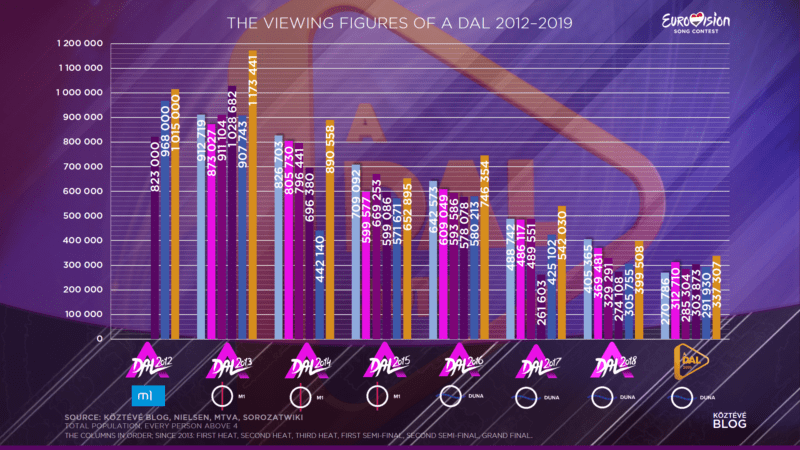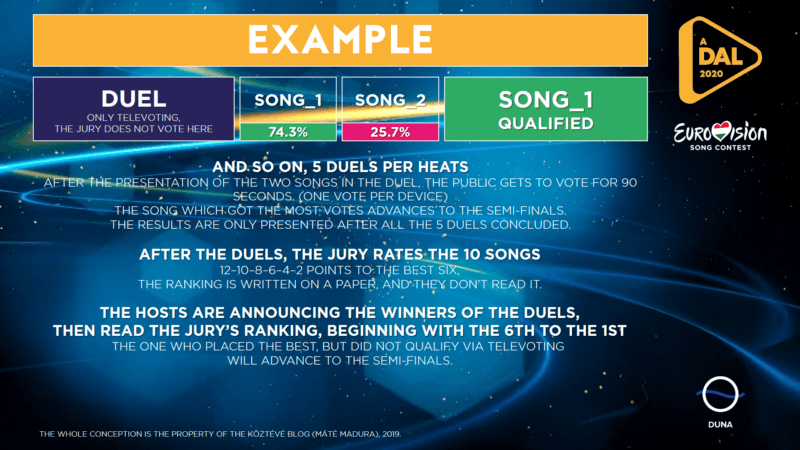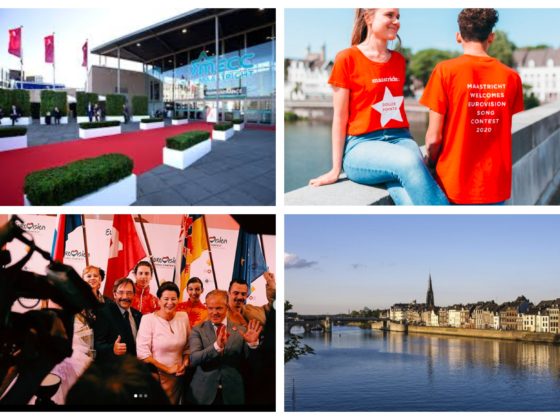From a song excluded for plagiarism allegations to juries allegedly sabotaging the public favourites, this year’s A Dal was anything but uneventful. So much so that it sparked debates not just in Hungary, but in the international fandom as well.
But no matter where fans call home, opinions converged on at least one big idea: the current A Dal format needs a refresh or maybe a total revamp. Unfortunately nobody has come up with a detailed proposal on how to do that.
Until now. Máté Madura, a music blogger who had behind-the-scenes access to the show from its earliest editions, has gathered his thoughts and drawn up a concept for revamping the show. With his approval, we’ve translated his thoughts and are happy to re-print his article below — and with his detailed graphics. These opinions are Máté’s and do not necessarily reflect the opinions of wiwibloggs and its staff members.
____
It’s been a while since I wrote on the Köztévé Blog (Public TV blog). But now I think it is really important to communicate my thoughts. There was a poll on the blog’s Facebook page, where I asked people if there is a need for changes in Hungary’s song selection show after our non-qualification. Yes. With capitals. The results won’t be a surprise even without revealing the numbers. But before I proceed to the facts, I have to say that I won’t only be explaining what’s wrong and why. Anyone could talk about that. Instead I’m doing what I think is wiser and am presenting a proposal.
The facts
At the end of May, the people were able to vote on the following question: “What do you think: has the time come for a revamp of the national selection format or does this have nothing to do with our non-qualification and things are great as they are now?”

Right (green) cassette: No, there’s no need for changes
Of the 357 voters, 335 (94%) agreed there’s a need for a revamp of the show. That’s motivation enough to write down thoughts for a new A Dal 2020 series.
The vision
The first and most important thing is “not to forget where you come from” (Misi Mező, Magna Cum Laude, Jury member of A Dal 2018 and 2019). This show started back in December 2011, with a tender looking for the song that would represent Hungary at Eurovision. Since then, Eurovision has only been referred to as an “international competition” and has slowly been put in the background. Yet people know — and have always known — that the goal of the show is Eurovision. It is not to find the song that “the country will be humming”, nor “the song of the country” (past A Dal slogans). We simply have 30 songs which will be narrowed down from week to week, so that in the end there would be only one act left: Duncan Mcleod, the Highlander Duncan Laurence, the Hollander. (Haha).
And we can’t complain too much about our Eurovision results. Of the eight A Dal winners three made the top ten, four made it to the final and only one failed to qualify. However, the ratings of the show and the buzz around it have kept falling from year to year. All of this could well come down to the format itself, particularly the marginal role of the public vote and how it fits in a landscape where media is consumed more quickly than ever. The show has failed to renew itself every year. With some formats the show is temporarily axed or put on hiatus to give it a break and refresh. But that’s not an option here — for a show that must run from week-to-week leading to a final. We have to show something new and be innovative, while we remain faithful to the original goals.

It needs to be said: in order to revive and become evergreen, the show must have a continuous renewal. In the Scandinavian countries with bigger Eurovision traditions, the national final shows are running for around half a century now. Obviously, what works in 1965, won’t work 20, 30 or 50 years later. Sweden’s Melodifestivalen can be considered the non plus ultra of national finals: since 2010 the show gave two Eurovision winners, two third places and three fifth places. They can’t complain about their results: the show is working. The view ratings in Sweden are topped by the national final and Eurovision itself every year, but the success wouldn’t be as big if they wouldn’t see the needs for changes. Even during the most successful times, the producer of the show has pulled some daring changes and brought in such novelties that, despite being met with skepticism, proved to be successful with time.
Back to A Dal: the humor, the excitement and the unexpected moments are the things that have slowly gone missing during the recent years. My suggestion would be that, while sticking to the aforementioned principles, A Dal should be put through a major revamp and a change of perspectives. First, it has to be decided if the show is made for the viewers, or for the four-piece jury. The comments of the professional jury should influence the televote, not vice versa, because as we have seen in the past couple of years, it does not just lead to nowhere, but it actually backfires. The two (jury and public) have to work together, not separately, otherwise, there won’t be a common segment, a common will that would prevail.

Ranking instead of giving points: The dated point system (1-10) doesn’t treat the show as a whole and doesn’t give a good overall picture of the acts, especially when it comes to the public voting since in the majority of cases the acts literally get an average score of five to six points, which don’t really influence the final outcome. This kind of system isn’t used on the international stage either, nor in the other countries’ national finals, except very rare occasions occurring once in a year in the best case. It’s true, other unorthodox methods aren’t used too often either, those things, however, are meant to increase the excitement, not to have such an influence on the outcome that it could wreck the entire format.
The CONCEPT – a detailed example
The beginning: duels in the heats: 10-10-10 songs, with 6-6-6 qualifiers per show (nothing new said so far)
In each show, 10 artists/groups would be pinned against each other in five duels. The acts would be matched based on their genre, songs, and overall strength. The duels would be announced on the first day of the week preceding the show, during a press conference which would be streamed online.
After the performances of the respective songs, the viewers would have 90 seconds to choose their preferred song and send their only vote via an app, SMS or online. The results wouldn’t be revealed after the duels, but only towards the end of the show: this way we’d get 5 direct qualifiers to the semifinals. The sixth finalist would be decided by the rankings of the four jurors present in the studio.
After seeing all 10 performances, the jurors would create their own top six ranking, so overall, the best-ranked song by the jury that hasn’t qualified previously would join the five direct qualifiers as a sixth qualifier. Due to the duels we already have an excitement factor, plus announcing the jury results would be a special moment not only for the public but for the jurors as well because they wouldn’t know each other’s rankings, nor the public’s choices, thus their potential bias would be minimalized. The hosts would begin announcing the jury ranking with the artist ranked overall sixth by the panel, and as soon as they’d read the name of a previously non-qualifier act, that respective act would get in an ‘advantage’, being in a qualifying position.
If everyone including the first place of the jury list has already qualified, then the previously mentioned act would be the sixth qualifier, but if the act on the first place would be also a non-qualifier, then the latter would go through. There would be four songs dropping out per show, as before.

Semifinals following the duels: nine-nine songs and four-four qualifiers
During the semis, the acts would compete in a ‘classic’ format. The nine songs are performed and the jury only gives a verbal review of the performances. After the last performance, the lines will open for five minutes as the first round of voting. After that, both the jury votes and the televote will be summarized separately and broken down in a system similar to Eurovision (12-10-8-6-4-2 points for the best 6 songs). The top three of this round will advance to the grand final. In the remaining part of the show, the second round of televoting will determine the fourth finalist from the six acts that didn’t qualify earlier.

The grand final: Eight songs, one winner
At the beginning of the broadcast, the hosts would start the televote for all the finalists. After the performances, the 10 regional juries (one of which is the panel sitting in the studio) award their points. The voting lines are open during and after the jury vote and after the televote is closed, the public’s points are awarded in proportion to the jury’s points, giving scores that are not specified in advance to the eight participants. The song that gets the most points, in the end, wins A Dal and represents Hungary at the Eurovision Song Contest.
One of the main principles of the Hungarian public media is that they’re producing content not only for the people in Hungary but to the Hungarian population of the entire Carpathian basin and the diaspora around the globe as well. Taking advantage of this, the aforementioned regional juries could be made of local musicians and artists who’d also have a say in the outcome of the show.
The points would be announced from the following cities (six home, four foreign): Debrecen (East Hungary), Pécs (Southwest Hungary), Szeged (Southeast Hungary), Győr (West Hungary), Miskolc (North Hungary), Budapest (the jury of A Dal present in the studio), Miercurea Ciuc (Transylvania, Romania, Note: MTVA has a studio and correspondence there), Uzhhorod (Zakarpattia Oblast – Ukraine), Bratislava (Southern Slovakia) and Subotica (Vojvodina, Serbia). It has to be said that the four foreign regions have a considerable Hungarian minority, thus (sticking to the aforementioned principles) artists and musicians from these regions would be in the juries from there. After the jury points are announced, the televote points would be added to the results in a 50-50% proportion, which would lead to the crowning of the winner.
Voting simulation video (in Hungarian) based on the 2018 edition of A Dal
The week following the final MTVA would reveal the full voting of the duels, semis and the final, including the detailed jury rankings and the number and proportion of public votes.
Conclusion
A Dal often gets criticized for having to listen to the same song three times throughout the show, with only minor changes both musically and staging-wise. This new concept would help to fix this, by keeping the basis of the show but making it more diverse and exciting. The viewers, the contestants, the producers, and the juries as well would see a show that would be able to continuously change, show new paths, and wouldn’t get boring too soon.
My goal is not to degrade or find anyone unfit to their job, as the only intention behind this writing is to improve things. I’m not a TV show format developer, nor someone who has been directly involved in TV productions, but I think I have an external perspective that could bring success to the show. We have seen cases when someone not closely related to the domain brought success to something, see the logo of the 2017 FINA Water World Championships for example. I’m not saying that my concept is the perfect formula that will guarantee the success 100%, but it is a consistent direction, that, after thorough research and a few rethinkings, could work in television. I’m not saying that this is the only way, but I believe that if we actually do something besides talking, and not only express our disapproval with how things are nowadays with the show, then we actually took a step forward. Let our goal be to make a good show together and find a song that will be hummed not only by the country but by the continent as well!
Do you like this concept of revamping A Dal? Or you have your own idea of putting the show back on track? Let us know in the comments!











http://i64.tinypic.com/m20r6.jpg
Waiting for shiki.A Dal will get even higher level.
I like the general idea, having regional juries of Hungarians in other countries seems like it would inevitably cause drama though (whatever the intentions behind it) – why not just one ‘diaspora’ jury?
Just send an English song. This year Joci was great, his song was great but no one understands a word of Hungarian. Doing a Portugal 2017 is almost impossible, the song needs to be in English tp be successful. Joci would probably have won with his entry a couple of years ago, had he sung it in English.
This would definitely make of A Dal a more interesting and transparent process. But I don’t see MTVA changing the format. Keep in mind they don’t even change the jurors…
Instead of having national or regional juries, an international jury would be a much better option
Just change all jury members and take away a bit (A BIT) of power from them. I think it will be enough. I don’t think A Dal needs a bigger change. Yes, the jury often make wrong decisions. Yes, they have a bit too much power (but they are still needed). But song-wise, A Dal still remains the best national selection from all by far. And I’d even dare to say, by some organization moments too. For example, they always hold the festival in the same studio with a pretty modest stage, but I suppose it helps to economy public… Read more »
Also something about dropping ratings: it only shows less interest from the audience (which is completely logical, nobody likes when their vote means very little, so I agree something should be done about it), but not from musicians too. If I remember correctly, this year A Dal recieved more than 1 thousand of songs submissed.
Whilst Hungary’s elimination was undeserved for Joci the broadcasters kinda needed this as a wake- up call because the selection system is flawed: the juries have too much power. A similar thing happened in Romania, Esters non-qualification was undeserved but TVR deserved it due to the wrong results of the NF (No shade to anyone on the jury but On A Sunday was not the best entry that night). Hopefully these two countries (and Armenia) will wake up and try to fix their selection methods.
Romania’s HoD promised that Selectia Nationala 2020 WILL be 50% jury and 50% televote.
Thank the lord. They’re finally getting it right. How hard was that, Romania?
Since the jury got rid of Toth gabi back in 2017 i stopped trusting them lmao
This is a great concept. Regardless, A Dal needs to be revised. They always have great songs, but as I’ve said before, the jury is FAR too powerful.
I like the concept. I’m not a fan of duels, because there’s a chance 2 great songs will fight for one spot while 2 weak songs will fight for another. But I admit it can be good for television ratings and being just in a 1st phase, the pairs can be formed more carefully. A Dal’s overall entries’ level has been good, but their (tiny) jury has way too much power. It’s not a surprise that the ratings are falling, you don’t want to spend weeks watching other people taking decisions that you should be helping to make.
Great idea, though I got pretty skeptical about the regional jury thing.
This would be sooooo much better
About the viewing figures falling down, couldn’t it just be Hungarians’ growing lack of interest in having anything to do with Europe and events like Eurovision?
I don’t believe so. The format with heats is kind of tiring tbh.
Nah, it’s not that deep mate. Hungarians just don’t really watch public broadcasting especially since it’s been promoting solely far-right ideas and government propaganda.
By that logic they wouldn’t watch sports competitions broadcasted by the public TV either. Yet they do. It’s not all just politics.
Ir looks a good concept for me. First round sounds similar to Mello’s AC, but it could work.
And I would have used Duncan Lacroix from Outlander, it seems even more similar to Duncan Laurence.